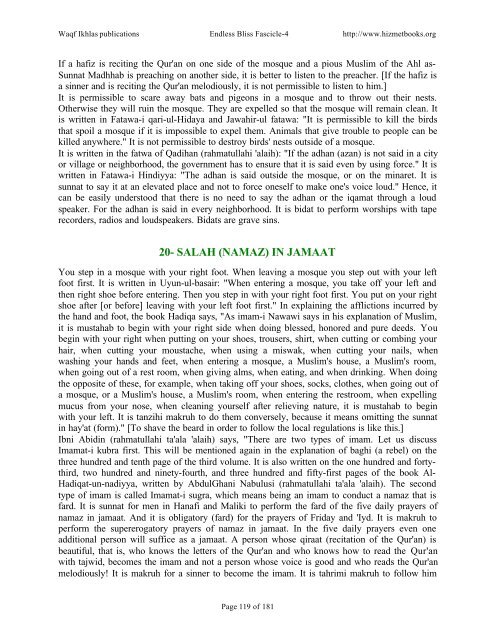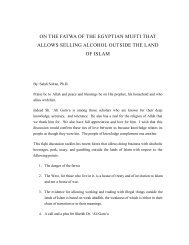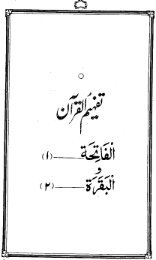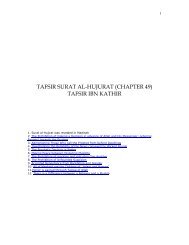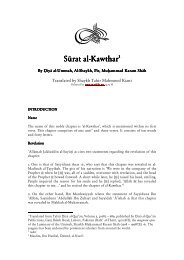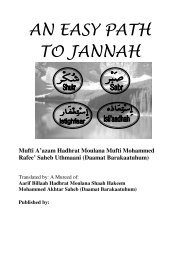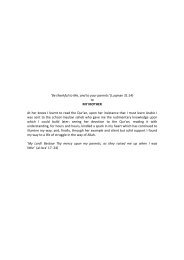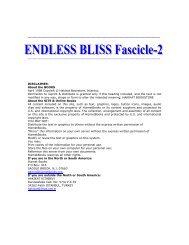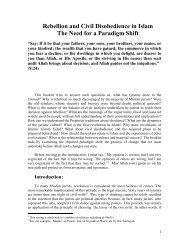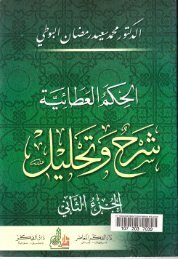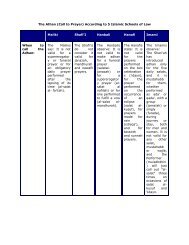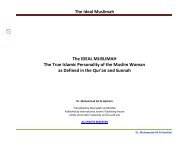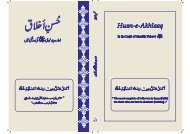ENDLESS BLISS FASCICLE-4
ENDLESS BLISS FASCICLE-4
ENDLESS BLISS FASCICLE-4
Create successful ePaper yourself
Turn your PDF publications into a flip-book with our unique Google optimized e-Paper software.
Waqf Ikhlas publications Endless Bliss Fascicle-4 http://www.hizmetbooks.org<br />
If a hafiz is reciting the Qur'an on one side of the mosque and a pious Muslim of the Ahl as-<br />
Sunnat Madhhab is preaching on another side, it is better to listen to the preacher. [If the hafiz is<br />
a sinner and is reciting the Qur'an melodiously, it is not permissible to listen to him.]<br />
It is permissible to scare away bats and pigeons in a mosque and to throw out their nests.<br />
Otherwise they will ruin the mosque. They are expelled so that the mosque will remain clean. It<br />
is written in Fatawa-i qari-ul-Hidaya and Jawahir-ul fatawa: "It is permissible to kill the birds<br />
that spoil a mosque if it is impossible to expel them. Animals that give trouble to people can be<br />
killed anywhere." It is not permissible to destroy birds' nests outside of a mosque.<br />
It is written in the fatwa of Qadihan (rahmatullahi 'alaih): "If the adhan (azan) is not said in a city<br />
or village or neighborhood, the government has to ensure that it is said even by using force." It is<br />
written in Fatawa-i Hindiyya: "The adhan is said outside the mosque, or on the minaret. It is<br />
sunnat to say it at an elevated place and not to force oneself to make one's voice loud." Hence, it<br />
can be easily understood that there is no need to say the adhan or the iqamat through a loud<br />
speaker. For the adhan is said in every neighborhood. It is bidat to perform worships with tape<br />
recorders, radios and loudspeakers. Bidats are grave sins.<br />
20- SALAH (NAMAZ) IN JAMAAT<br />
You step in a mosque with your right foot. When leaving a mosque you step out with your left<br />
foot first. It is written in Uyun-ul-basair: "When entering a mosque, you take off your left and<br />
then right shoe before entering. Then you step in with your right foot first. You put on your right<br />
shoe after [or before] leaving with your left foot first." In explaining the afflictions incurred by<br />
the hand and foot, the book Hadiqa says, "As imam-i Nawawi says in his explanation of Muslim,<br />
it is mustahab to begin with your right side when doing blessed, honored and pure deeds. You<br />
begin with your right when putting on your shoes, trousers, shirt, when cutting or combing your<br />
hair, when cutting your moustache, when using a miswak, when cutting your nails, when<br />
washing your hands and feet, when entering a mosque, a Muslim's house, a Muslim's room,<br />
when going out of a rest room, when giving alms, when eating, and when drinking. When doing<br />
the opposite of these, for example, when taking off your shoes, socks, clothes, when going out of<br />
a mosque, or a Muslim's house, a Muslim's room, when entering the restroom, when expelling<br />
mucus from your nose, when cleaning yourself after relieving nature, it is mustahab to begin<br />
with your left. It is tanzihi makruh to do them conversely, because it means omitting the sunnat<br />
in hay'at (form)." [To shave the beard in order to follow the local regulations is like this.]<br />
Ibni Abidin (rahmatullahi ta'ala 'alaih) says, "There are two types of imam. Let us discuss<br />
Imamat-i kubra first. This will be mentioned again in the explanation of baghi (a rebel) on the<br />
three hundred and tenth page of the third volume. It is also written on the one hundred and fortythird,<br />
two hundred and ninety-fourth, and three hundred and fifty-first pages of the book Al-<br />
Hadiqat-un-nadiyya, written by AbdulGhani Nabulusi (rahmatullahi ta'ala 'alaih). The second<br />
type of imam is called Imamat-i sugra, which means being an imam to conduct a namaz that is<br />
fard. It is sunnat for men in Hanafi and Maliki to perform the fard of the five daily prayers of<br />
namaz in jamaat. And it is obligatory (fard) for the prayers of Friday and 'Iyd. It is makruh to<br />
perform the supererogatory prayers of namaz in jamaat. In the five daily prayers even one<br />
additional person will suffice as a jamaat. A person whose qiraat (recitation of the Qur'an) is<br />
beautiful, that is, who knows the letters of the Qur'an and who knows how to read the Qur'an<br />
with tajwid, becomes the imam and not a person whose voice is good and who reads the Qur'an<br />
melodiously! It is makruh for a sinner to become the imam. It is tahrimi makruh to follow him<br />
Page 119 of 181


